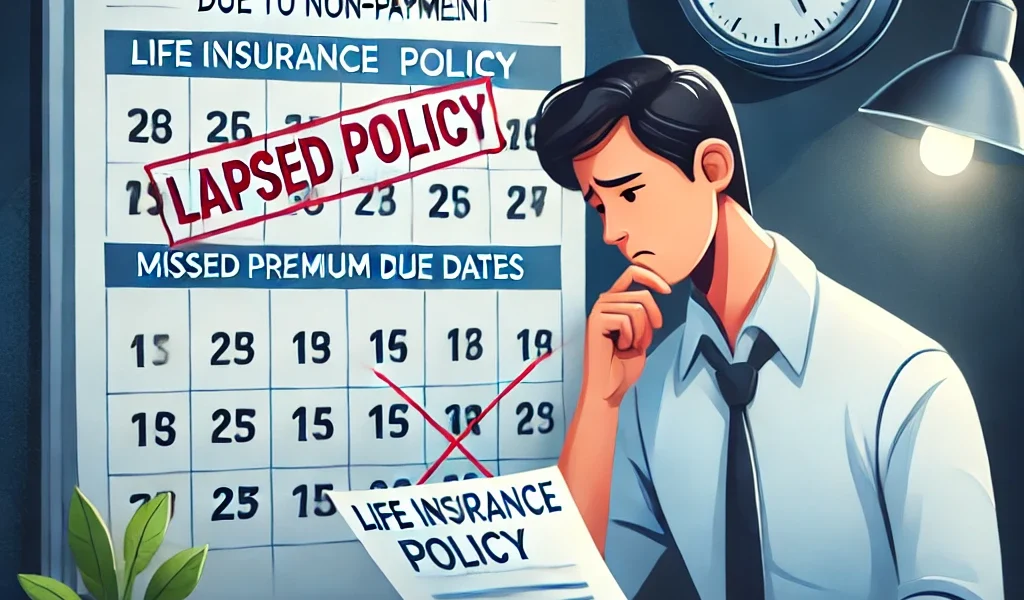Introduction
Life insurance is a crucial financial tool that ensures the financial security of your loved ones. However, what happens if you stop paying your premiums? Whether it’s due to financial constraints, policy misunderstandings, or other personal reasons, missing life insurance payments can have serious consequences.
In this comprehensive guide, we will explore the impact of discontinuing life insurance premium payments, potential solutions, and strategies to prevent policy lapse.
1. Immediate Consequences of Missing a Premium Payment
If you miss a life insurance premium payment, your policy doesn’t get canceled immediately. Here’s what typically happens:
✔ Grace Period: Most insurers offer a grace period of 15 to 30 days (depending on the insurer and policy type). During this period, you can make the overdue payment without penalties, and the policy remains active. ✔ No Immediate Coverage Loss: If the insured person passes away during the grace period, the insurer still pays the death benefit, but they may deduct the unpaid premium amount. ✔ Late Payment Fees: Some insurers may charge a late fee if payment is made after the due date but within the grace period.
📌 Example: If your premium is due on January 1st and you fail to pay, but the insurer provides a 30-day grace period, you have until January 30th to pay before the policy lapses.
2. What Happens When the Grace Period Ends?
Once the grace period expires and the payment is still not made, the consequences depend on the type of policy:
➤ Term Life Insurance
✔ Policy Lapses: If you miss the payment beyond the grace period, your policy lapses, and you lose all benefits. ✔ No Refunds: Since term insurance has no cash value, you don’t get any refunds for past premiums paid. ✔ Reinstatement Option: Some insurers allow reinstatement within a specific timeframe (usually 6 months to 2 years), but you may need to undergo a medical check-up and pay past-due premiums with interest.
➤ Whole Life or Universal Life Insurance
✔ Cash Value May Cover Payments: If your policy has accumulated cash value, the insurer may deduct premiums from it to keep the policy active. ✔ Policy Might Convert to Reduced Paid-Up Insurance: Instead of lapsing, some policies automatically adjust coverage based on available cash value. ✔ Loan Against Cash Value: Some policies allow borrowing against the accumulated cash value to pay premiums. ✔ If Cash Value is Depleted, Policy Lapses: Once the cash value is exhausted and premiums are still unpaid, the policy will lapse.
📌 Example: If you have a universal life insurance policy with ₹2 lakh in cash value, and your premium is ₹20,000 per year, the insurer may deduct the premium from your cash value until it runs out.
3. How to Reinstate a Lapsed Life Insurance Policy
If your life insurance policy lapses due to non-payment, you may still have an opportunity to reinstate it:
✔ Reinstatement Period: Most insurers offer 6 months to 2 years to reinstate a lapsed policy. ✔ Medical Examination: Some insurers may require a fresh medical check-up before reinstating. ✔ Payment of Outstanding Premiums: You must pay all missed premiums along with potential interest or late fees. ✔ Higher Premiums: The insurer may increase your premium based on age or new health conditions.
📌 Example: If your policy lapsed 8 months ago and you apply for reinstatement, the insurer may ask you to pay past-due premiums, undergo a health check-up, and possibly pay higher premiums if your health has deteriorated.
4. Alternative Solutions If You Can’t Afford Premiums
If you’re struggling to make premium payments, consider these alternatives before letting the policy lapse:
➤ Reduce the Coverage Amount
✔ Many insurers allow policyholders to reduce the sum assured to lower premium costs. ✔ Suitable for those who still need coverage but at a reduced level.
➤ Switch to a Paid-Up Policy (For Whole Life & Universal Life Insurance)
✔ Instead of paying full premiums, your policy converts to a paid-up policy with a lower death benefit but no further premiums. ✔ Ensures that you retain some coverage instead of losing it completely.
➤ Take a Policy Loan
✔ If you have a whole life or universal life policy with cash value, you can take a loan against your policy to pay premiums. ✔ The outstanding loan amount (plus interest) is deducted from the death benefit.
➤ Use Premium Waiver Riders
✔ If you’re unable to pay due to disability or job loss, a premium waiver rider can keep the policy active. ✔ This rider ensures that the insurer covers your premiums under specific circumstances.
📌 Example: If you become disabled and have a premium waiver rider, your life insurance remains active without any premium payments.
5. Preventive Measures to Avoid Policy Lapse
To avoid the stress of policy lapse, follow these best practices:
✔ Set Up Automatic Payments: Enable auto-debit to ensure premiums are paid on time. ✔ Opt for Annual Payments: If possible, pay premiums annually instead of monthly to avoid frequent due dates. ✔ Keep an Emergency Fund: Maintain at least 3-6 months of expenses to cover insurance costs during financial difficulties. ✔ Notify a Family Member: Keep a trusted family member informed about your policy so they can remind you of payments. ✔ Review Policy Regularly: Assess your policy coverage every 6-12 months and make necessary adjustments.
📌 Example: Setting up auto-pay through your bank ensures that your premiums are deducted automatically, preventing accidental lapses.
Conclusion: Stay Protected, Stay Informed
Stopping life insurance premium payments can have serious consequences, from policy lapse to financial loss. However, insurers provide grace periods, reinstatement options, and alternative solutions to help policyholders maintain coverage.




